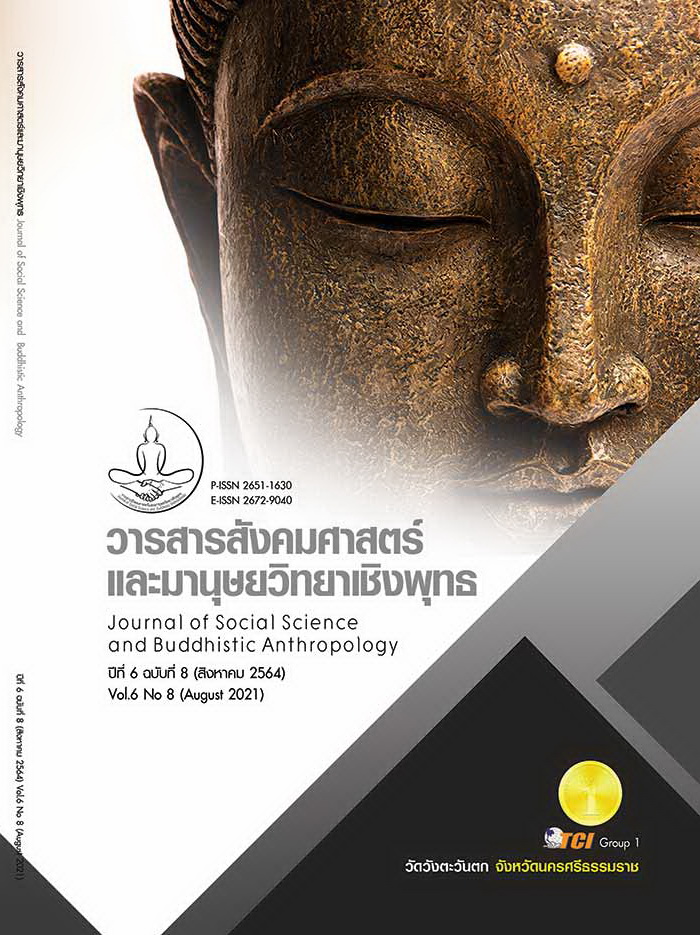THE GUIDELINES FOR THE MANAGEMENT OF ELECTRONIC WASTE (E-WASTE): A CASE STUDY OF NONG TOK PAN, YANG TALAT, KALASIN
Keywords:
E-Waste Problem, Qualitative Research Method, The Management of E-WasteAbstract
This academic article is to provide recommendations on how to manage the electronic waste (e-Waste). The quantitative approach is applied to collect and analyze data. The in-depth interview is applied to collect data whilst the semi-structured interview is employed to collect the insightful information from the interviewees comprising thirty-two stakeholders. The interviewees are the residents, government officers, and the stakeholders residing in the unit of study and they are the residents who are directly affected by the electronic waste (e-Waste) problems. The Purposive Sampling Strategy and Convenience Sampling Strategy are applied to select the interviewees since they are close to and dealing with the problem investigated in this research During the process of question preparation, the focus group interview, each group contains 4-5 interviewees, is applied to formulate the semi-structured questions derived from 45 interviewees containing twenty-two females and twenty-three males. Furthermore, the pilot study is applied to ensure the trustworthiness of the research with two interviewees; an officer of the Local Government Organization and a resident in the community. In addition, the semi-structured questions are amended to be more concise. The actual interview has taken place from 1st to 30th March 2020. In addition, during the interview sessions, observations, notebooks, digital voice recorders are utilized to collect data Finally, the findings indicate that Transformational Leadership, Process Innovation, and Product Innovation are useful to increase levels of satisfaction of the stakeholders in managing the electronic waste (e-Waste). Lastly, the recommendations, implementations, limitations, and suggestions for future research are provided.
References
กรมควบคุมมลพิษ. (2561). ข้อมูลองค์กรปกครองส่วนท้องถิ่น อบต.หนองตอกแป้น. เรียกใช้เมื่อ 6 มิถุนายน 2563 จาก https://thaimsw.pcd.go.th/localgovdetail.php?id =3894
กองบรรณาธิการวอยซ์ออนไลน์. (2561). ร้องแก้คัดแยกขยะพิษ หลังชุมชนใกล้เคียงรับกลิ่นเหม็นทรมานกว่า 20 ปี. เรียกใช้เมื่อ 6 มิถุนายน 2563 จาก http://www.voicetv. co.th/read/SyX5D6iLX
ณิชชา บูรณสิงห์. (2561). ขยะอิเล็กทรอนิกส์: ขยะพิษมหันตภัยร้ายจากเทคโนโลยี. เรียกใช้เมื่อ 6 มิถุนายน 2563 จาก https://library2.parliament.go.th/ejournal/content _af/2561/aug2561-2.pdf
นิภาพร ปานสวัสดิ์. (2562). ภาวะผู้นำการเปลี่ยนแปลงของผู้นำชุมชุนเพื่อสันติภาพ. วารสารสันติศึกษาปริทรรศน์ มจร, 7(5), 1502-1515.
สมนึก เอื้อจิระพงษ์พันธ์ และคณะ. (2553). นวัตกรรม: ความหมาย ประเภท และความสำคัญ ต่อการเป็นผู้ประกอบการ. เรียกใช้เมื่อ 6 มิถุนายน 2563 จาก http://www.jba.tbs .tu.ac.th/files/Jba128/Article/JBA128Somnuk.pdf
สยามรัฐออนไลน์. (2561). สธ.เมืองน้ำดำหยุดสร้างภาพวอนลงพื้นที่ตรวจสุขภาพพื้นที่รองรับกลิ่นขยะพิษ. เรียกใช้เมื่อ 6 มิถุนายน 2563 จาก https://siamrath.co.th/n/45650
สวรรยา ธรรมอภิพล และคณะ. (2560). ความรู้ในการจัดการขยะอิเล็กทรอนิกส์ในครัวเรือนของชุมชนบ้านตลาดเขต จังหวัดกาญจนบุรี. วารสารวิชาการฉบับภาษาไทย สาขามนุษยศาสตร์ สังคมศาสตร์ และศิลปะ, 10(3), 1630-1642.
อภิญญา กิจเกิดแสง. (2562). พฤติกรรมและความรู้ของประชาชนในการจัดขยะอิเล็กทรอนิกส์กรณีศึกษา ตำบลหัวโพ จังหวัด ราชบุรี. ใน วิทยานิพนธ์ศิลปศาสตรปริญญามหาบัณฑิต สาขาการจัดการภาครัฐและเอกชน. มหาวิทยาลัยศิลปากร.
European Commission. (2003). Directive 2002/96/EC on Waste Electrical and Electronic Equipment. Official Journal of the European Union, Luxembourg, 37(1), 24-38.
Tiger, B. (2020). ประสิทธิภาพ ประสิทธิผล ต่างกันอย่างไร – มี KPI อะไรบ้าง. เรียกใช้เมื่อ 6 มิถุนายน 2563 จาก https://thaiwinner.com/efficiency-effectiveness/
Waste 360 technology report. (2020). State of the art mobile technology can help you mitigate operational risks through Real-Time Data Exchange. Retrieved July 2, 2020, from https://www.waste360.com/fleets-technology/state-art-mobile-technology-can-help-you-mitigate-operational-risks-through-real









